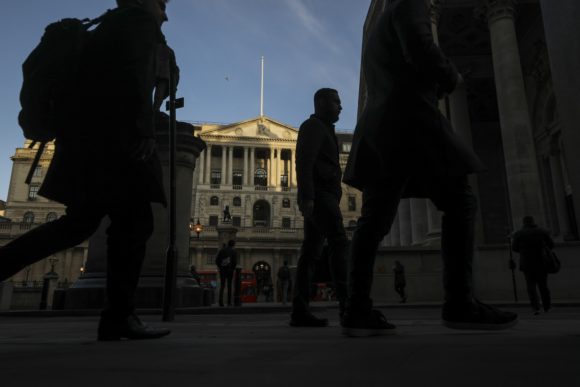Mark Carney said he’s lucky he never had to cut interest rates below zero as Bank of England governor because they would have damaged the UK.
Carney, who leaves the central bank next month, has long been opposed to negative rates, a tool used in other economies such as the euro area and which has proved controversial.
“I accept that in other jurisdictions they can work, but I’m feeling fortunate that at least it looks like I’m going to get out without having negative rates,” he said in a Bloomberg Television interview. “I’m not a huge fan.”
The governor is departing as global central banks and governments grapple with the dilemma of how they would handle another downturn given their limited ammunition. Key rates around the world are already at or near historical lows.
“We’re close to those limits,” Carney said. He sees a risk of a global so-called liquidity trap, in which floods of central-bank cash fail to boost spending,” but “we’re not yet there.”
Carney also expressed opposition to measures such as helicopter money that tangle up monetary and fiscal policies. He described it as a “dangerous idea,” saying his view is neither the BOE or the Federal Reserve would go that route.
“I’m a strong believer in the separation of responsibilities,” he said in the interview, which was conducted mid-January. A government “may have fiscal room and they may use it, but that’s not helicopter money, and the fusion of the two I think is not necessary.”
Some of Carney’s tenure was dominated by complaints from pro-Brexit politicians who accused him of bias and over-stating the impact that leaving the EU would have on the economy. While some of that extended to calls for him to quit, Carney accepts that dealing with a backlash comes with the job.
“It’s the nature of these roles, public roles, that you will be criticized,” he said. “It’s fair game. It’s not always pleasant, but it is what it is.”
Carney hasn’t said what he plans to do when he leaves the BOE, though he will advise Prime Minister Boris Johnson on finance for the COP26 United Nations climate change conference. One goal there will be to get businesses to figure out how they prepare for a low-carbon world, Carney said.
Already a climate finance envoy for the UN, he’s been at the forefront of central banks’ involvement in assessing the economic risks from climate change. That’s likely to continue to play a big role in finance.
“We oversee the insurance sector, and we see the actual physical manifestations of extreme weather events, and we see where that’s likely to go,” he said. “I’m afraid what’s baked in in the atmosphere effectively is more and more of these, even if we start to make serious progress.”
Photograph: Commuters walk past the Bank of England in London, U.K., on Friday, Nov. 8, 2019. Photographer: Simon Dawson/Bloomberg.
Topics Climate Change
Was this article valuable?
Here are more articles you may enjoy.



 Florida Engineers: Winds Under 110 mph Simply Do Not Damage Concrete Tiles
Florida Engineers: Winds Under 110 mph Simply Do Not Damage Concrete Tiles  Insurify Starts App With ChatGPT to Allow Consumers to Shop for Insurance
Insurify Starts App With ChatGPT to Allow Consumers to Shop for Insurance  AIG’s Zaffino: Outcomes From AI Use Went From ‘Aspirational’ to ‘Beyond Expectations’
AIG’s Zaffino: Outcomes From AI Use Went From ‘Aspirational’ to ‘Beyond Expectations’  AIG Underwriting Income Up 48% in Q4 on North America Commercial
AIG Underwriting Income Up 48% in Q4 on North America Commercial 

